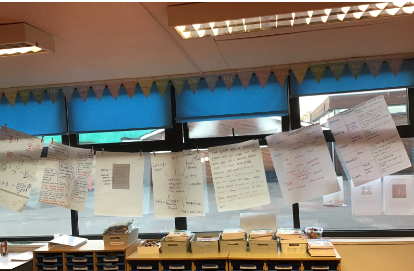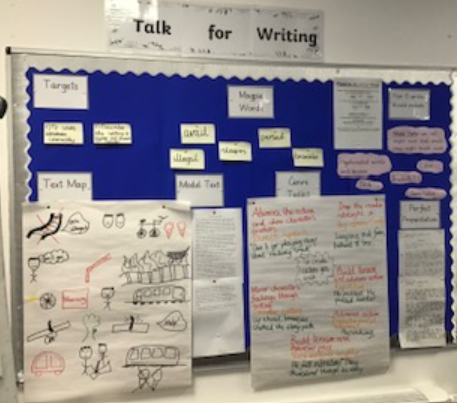Writing
We teach writing through Pie Corbett’s ‘Talk for Writing’ approach. Talk for Writing is used to teach fiction, non-fiction and poetry through a multisensory approach.
Each term, year groups will have a fiction and non-fiction genre identified on the LTP with an accompanying toolkit.
All T4W units start with a cold write task (which is carried out a number of weeks prior to the unit being taught). This task enables teachers to identify whole class targets and group writing targets, which they can then build into the planning of that unit.
There are three main stages:
IMITATION – familiarisation
This involves retelling a story or text until it can be told fluently. It also involves analysing the text and understanding the structural and language features.
Within this stage, children will be exposed to short burst writing opportunities where teachers will focus teaching and support around identified targets for the class. Children will also have the opportunity to write in role.
INNOVATION – adapting the text
This involves using the model from the ‘imitation’ phase and developing the text even further.
INDEPENDENT APPLICATION – creating your own text.
This involves building up a new story or text independently and applying the features taught throughout the unit.
All T4W units will then end with a hot write where children have the chance to apply the skills they have learnt about that genre and toolkit
To support this, we use a range of high quality texts, some of which are linked closely to our curriculum topics to engage all pupils and allow them to write for a clear purpose and audience.
All classes will have a T4W working wall and washing line to help display work from across a T4W unit and to build consistency and a common approach for the children across the whole school.


Vocabulary
We strongly agree with the statement by James Britton that ‘Reading and writing float on a sea of talk’. All adults use aspirational vocabulary when talking to children – ‘never dodge a good word’, Classes across the school are encouraged to magpie words in all lessons across the curriculum and can record on their magpie wall (EYFS/Yr1) or in their magpie books.
Spelling: We are Spelling Stingers! Our local rugby team Wasps previously launched this initiative to raise the profile of spelling with a visit from the rugby mascot Sting himself! Each week there is a taught spelling focus in lessons which follows the NC Appendix of spelling rules, and teach Common Exception Words. Every child has a Spelling Journal where they practise their spellings at home, ready for their weekly test. The journal includes advice for parents and ideas on how to learn rules and words.
Grammar, punctuation: Grammar and punctuation are taught within lessons, through direct teaching and within the modelling of writing. Teachers use the National Curriculum to ensure progression and grammar starters are built into lessons to help revise and revisit key concepts, using resources from the Vocabulary Ninja. Every class has the appropriate grammar tracker displayed for quick reference of key grammar vocabulary.
Handwriting: we teach handwriting using the Nelson Handwriting scheme, with correct letter formation as the initial focus, leading to the introduction of cursive handwriting in Y2. We teach specific lessons every week with practise time. For those children for whom handwriting presents difficulties, we provide small group handwriting activities using warm-up techniques.
